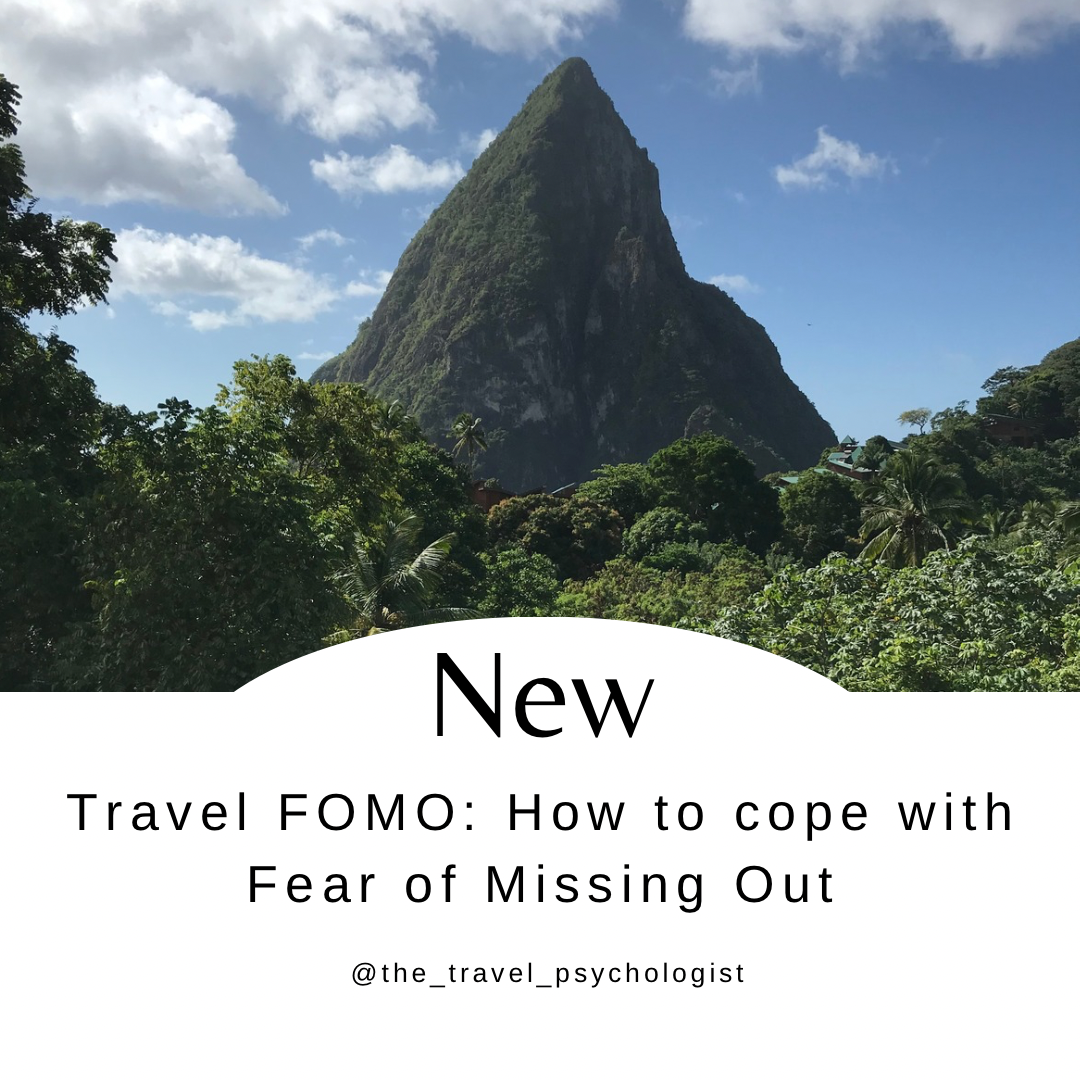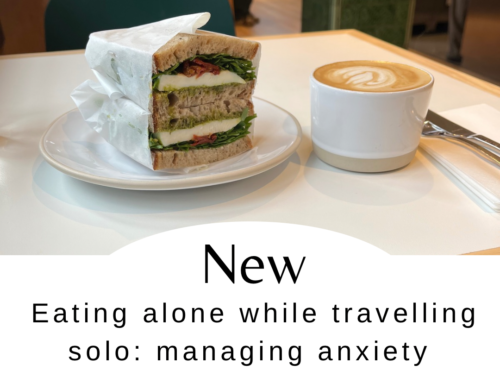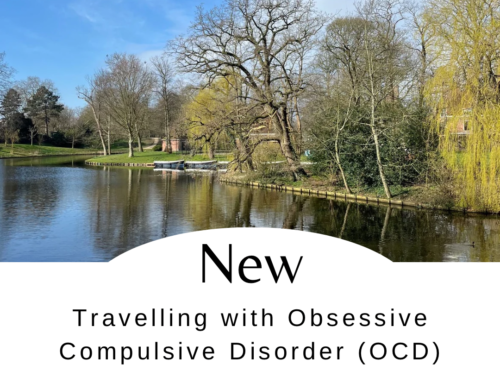Dr Charlotte Russell, Clinical Psychologist & Founder
If you are passionate about travel you will probably enjoy hearing about it, following travel Instagram accounts and watching travel related TV. It can be fun and inspiring. But what can we do if travel related content starts to trigger travel FOMO? In this article I’m going to talk you through this phenomenon and provide tips on how to manage it.
What is FOMO?
FOMO is defined as anxiety about not being present at activities enjoyed by our peers. Typically FOMO is triggered by others enjoying activities we view as meaningful, pleasurable or momentous (Przybylski et al., 2013). Put simply, when we see other people who are like us doing things that seem amazing, we experience anxiety about not currently having these experiences ourselves.
There is a strong relationship between this anxiety about missing out and problematic social media use (Gupta and Sharma, 2021). Feelings of FOMO can drive compulsive behaviour related to repeatedly checking social media as an attempt to avoid missing out. Unsurprisingly, this vicious cycle has been found to be related to poorer well-being (Stead and Bibby, 2017., Altuwairiqi et al., 2019.)
Why do we experience FOMO?
It has been suggested that we experience FOMO because of our inherent needs to feel a sense of meaning and belonging (Przybylski et al., 2013). If we think about our evolution, these needs would have prompted us into action in years gone by. If we weren’t getting involved with important activities within our community, our FOMO would have motivated to get involved. When we lived in small groups this would have been good for us and good for our community.
However, nowadays we can view the lives of countless people through our smartphones. We can’t possibly keep up with all of the people we see on social media and have all of the experiences that exist. In simpler times, FOMO may have once have prompted us into action when needed. However now comparing our lives to others and focusing on what we’re not doing is just likely to make us feel inadequate, anxious and even hopeless.
What is travel FOMO?
Within the academic research, there are two aspects to the definition of travel FOMO.
Firstly, travel FOMO is a fear of missing out on travel opportunities and experiences especially when others are travelling (Zaman et al., 2022).
Secondly, Travel FOMO can also encompass fears about missing out on particular sights or destinations that are viewed as memorable and unique (Zaman, 2024).
We may typically experience the first aspect of travel FOMO when we are at home and people we know are travelling or when we see pictures posted by bloggers or influencers. For many of us who are employed and aren’t in a position to travel as much as we’d like to, this is probably where we experience travel FOMO most.
As an example this quite often comes up for me when I see people travelling to amazing places like Machu Picchu. It’s not a destination that’s easy to visit from the UK and would probably require more time travelling the region than I can currently take off. It fulfils the criteria for FOMO because visiting Machu Picchu is definitely an experience I would view as memorable and momentous. So for me this triggers thoughts like ‘Will I ever be able to go there?’ and ‘How am I going to take that much time off?’. If I didn’t keep it in check this could even spiral to ‘my life is boring’ or ‘it’s not fair that others get to travel and I don’t’. These kinds of thoughts are not included in the recipe for a good day!
The second aspect of FOMO may show up when we are at home or even when we are travelling. We may feel a sense of pressure that we have to see and do everything. When we are travelling, this has the danger of us ending up treating destinations and experiences like a checklist to tick off rather than really experiencing them.
When we experience feelings of FOMO there is two ways this can go. We can notice and acknowledge the feeling and let it pass, as it inevitably will. However what tends to happen if we don’t have our travel FOMO in check is that we may experience unhelpful thoughts and evaluations about ourselves and our lives. This can turn into a vicious spiral that can lead us to feeling frustrated that we are not travelling or even dissatisfied with our lives. We don’t want travel FOMO to trigger this vicious cycle so it is crucial that we learn to respond more helpful to these feelings when they show up.
Tips for coping with travel FOMO
Acknowledging FOMO and letting it pass
Understanding what FOMO is and why we experience it can help us to notice these feelings and respond more helpfully to them. If we don’t feed our FOMO with unhelpful thinking, the initial feeling will pass very quickly. The more you are able to identify and label travel FOMO this will become easier over time.
Identifying unhelpful thoughts that can cause travel FOMO to spiral
Cognitive behavioural therapy (CBT) is one of the most widely used and effective types of psychological therapy. This approach teaches us to identify and to challenge How to spot unhelpful thinking that might be leading to distress.
Here are some examples of unhelpful thoughts that may amplify feelings of FOMO and lead it to spiral:
Thoughts about missing out
I’m never going to have that experience
When am I ever going to be able to visit that place?
If I don’t go there I will miss out
Negative social comparisons
Others lead more exciting lives than I do
My life is boring
Everyone else is out there having fun and I’m just here working
It’s not fair that they get to have that experience and I’m here
Self-critical thoughts
I’m boring and not adventurous enough
It’s my fault that I don’t get to have these experiences
I’m not good enough
I’ve made bad decisions and that’s why I’m here and not there
When we have noticed the specific unhelpful thoughts that are fuelling our FOMO, it’s important to challenge them. Try and think about what you might say if you were taking a more logical, helpful and compassionate approach. Think about what would you say to dear friend if they were experiencing this.
Managing your social media use
Setting limits
There are positives to social media including being able to follow our interests, find helpful information and connect with others who are like-minded. However there are also a lot of The negatives of social media related to social comparisons and because there is a constant flow of information that is hard to switch off from. These negatives can have an impact on our concentration and focus and how we feel about ourselves. In an ideal world we would learn to use social media in a way that allows us to harness the positive aspects and protect ourselves from the negatives.
The most helpful way of doing this is to set up limits to when and how you will use social media. This might be at certain times a day or for certain purposes. We all know that mindlessly scrolling is unhelpful for us so identify under what circumstances you are most likely to do this and do something else!
Critiquing the perfect images
We all know in our logical minds that social media is not an accurate depiction of reality. People show only the best bits and only what they want to show. But a bit like with airbrushed images – just because we know it isn’t real, doesn’t necessarily stop the negative impact (Tiggeman et al., 2013). This is one of the reasons that controlling your exposure to unrealistic accounts is important.
Choosing who to follow
When thinking about who to follow I would encourage you to think about whether you admire or feel a connection with the person you follow for something other than their travel focused content. If they solely post about where they’ve been and what they’ve been doing then it may not be a balanced or helpful account to follow. Are they offering helpful tips, humour, interesting thoughts or anecdotes? I’d encourage you to limit your exposure to accounts that are purely #inspo.
Joy of Missing Out (JOMO)
JOMO is intended to be the antithesis of FOMO – it’s about finding the joy in the time that you might otherwise be spending on social media. It has a definite overlap with strategies such as gratitude and mindfulness. This excellent article provides more information on Embracing JOMO: Finding Joy in Missing Out
Gratitude
Life at home
Being able to tap into what we are grateful for is crucially important for our well-being. People are sometimes put off by the idea of gratitude because it can come across as dismissive or be labelled as ‘toxic positivity’. However as human beings we adapt very quickly to the positive and enjoyable aspects of our lives and so our appreciation does naturally decline. This is a concept known as hedonic adaptation. Having a regular gratitude practice or ritual isn’t intended to be ‘toxic positivity’, but is a way to address the natural decline in appreciation that is part of being human.
Travel experiences
Being grateful for the travel experiences that we have had is important in being able to deal with the FOMO that comes up with not being able to see and do everything. There are so many beautiful and wonderful places out there that we could spend the whole time focusing on what we haven’t done and not enjoying what we actually get to do. Quite simply this strategy is about focusing on and being grateful for what you have done and will do, rather than focusing on what you haven’t done or won’t do.
Plan your vacations around what is most important for you rather than the most popular sights and activities that may not be interesting or meaningful to you. Find a way to cultivate gratitude for your experiences and to remember the time that you had. Getting creative can be a great way to do this and I wrote more about this in should I share my travel photos on social media?
Building a life outside of travelling
The constraints of being employed and finances mean that for most us, it is not possible to travel as much as we’d like to. That means that it is important to have things that we are passionate about in our day to day lives. These can provide an important focus when we are not travelling.
Having hobbies and activities that you love is a great example of this. These can buffer the effects of post travel blues when you return home. For me, coming home means that I can get back to my usual yoga classes and I’ve found that it does make coming home not all that bad.
Having seasonal events and traditions to look forward to can also help. As a personal example, summer is my favourite season and I used to dread the nights drawing in around Autumn. For me this meant the end of my summer adventures and this was difficult for me because the next year would feel so far away. In recent years I have really embraced Autumn and it has helped significantly with this feeling. It has been as simple as making an Autumn music playlist that I love. I also make a point of buying a few small items of clothing or homeware each year to add to a sense of cozy-ness. What works for you might be different to this but it is important to be intentional in looking after yourself when you are not travelling rather than saving every penny for your travels.
Conclusion
Travel FOMO is the feeling of anxiety that we experience when we see others having memorable travel experiences. Left unchecked, this feeling can spiral into unhelpful and self-critical thoughts about ourselves and our lives. Noticing this feeling and having ways of managing it is important to help us manage travel FOMO and to enjoy and appreciate the travel experiences that we do have. This can help us to cultivate a positive attitude and to look after our well-being whether or not we are travelling.
References
Alutaybi, A., Al-Thani, D., McAlaney, J., & Ali, R. (2020). Combating fear of missing out (FoMO) on social media: The FoMO-R method. International journal of environmental research and public health, 17(17), 6128.
Altuwairiqi, M.; Jiang, N.; Ali, R. Problematic Attachment to Social Media: Five Behavioural Archetypes. Int. J. Environ. Res. Public Heal. 2019, 16, 2136
Gupta, M., & Sharma, A. (2021). Fear of missing out: A brief overview of origin, theoretical underpinnings and relationship with mental health. World journal of clinical cases, 9(19), 4881.
Przybylski, A.K., Murayama, K., DeHaan, C.R. and Gladwell, V. (2013), “Motivational, emotional, and behavioral correlates of fear of missing out”, Computers in Human Behavior, Vol. 29 No. 4, pp. 1841-1848.
Stead, H. and Bibby, P.A. (2017), “Personality, fear of missing out and problematic internet use and their relationship to subjective well-being”, Computers in Human Behavior, Vol. 76, pp. 534-540.
Tiggemann, M., Slater, A., Bury, B., Hawkins, K., & Firth, B. (2013). Disclaimer labels on fashion magazine advertisements: Effects on social comparison and body dissatisfaction. Body image, 10(1), 45-53.
Zaman, U., Barnes, S. J., Abbasi, S., Anjam, M., Aktan, M., & Khwaja, M. G. (2022). The bridge at the end of the world: Linking Expat’s pandemic fatigue, travel FOMO, destination crisis marketing, and vaxication for “greatest of all trips”. Sustainability, 14(4), 2312.
Zaman, U. (2024). Nexus of Regenerative Tourism Destination Competitiveness, Climate Advocacy and Visit Intention: Mediating Role of Travel FOMO and Destination Loyalty. Sustainability, 16(17), 7827.
If you liked this article check out How to deal with travel anxiety: fear of something bad happening





